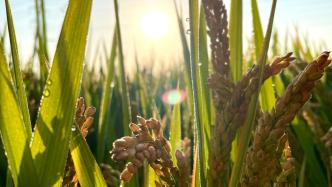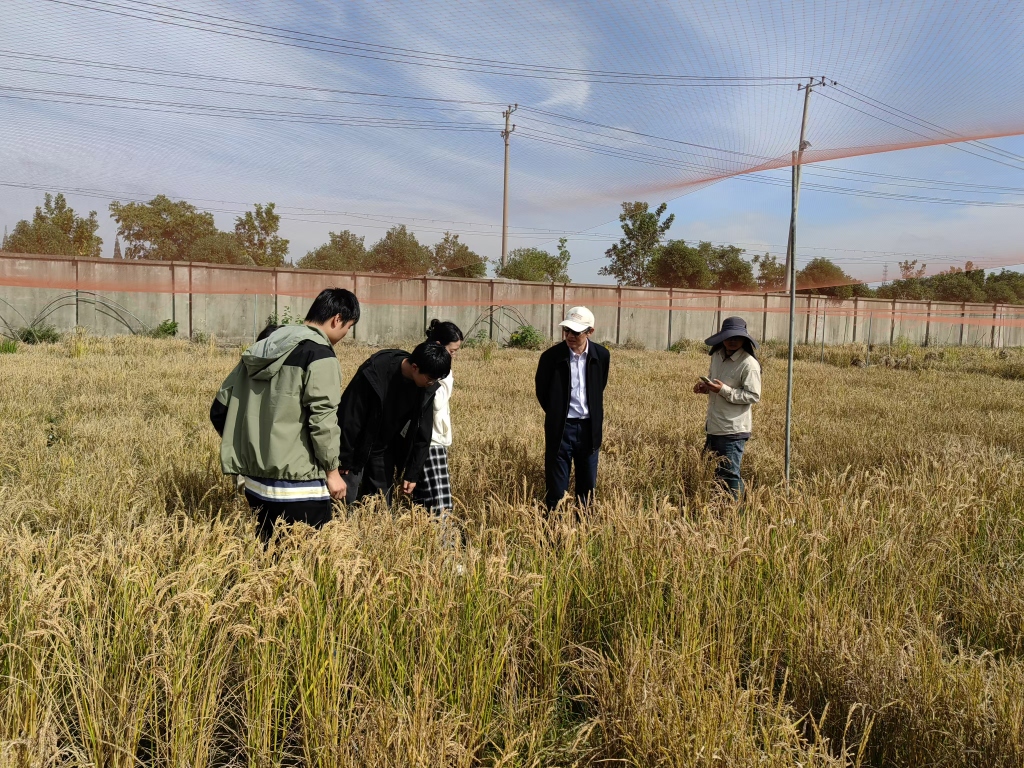
·Academician Yang Weicai believes that there is currently very little basic research on how plants adapt to climate change, and research on related plant molecular mechanisms needs to be strengthened in the future. At the same time, he also agrees with the view of continuing to explore the excellent genetic resources existing in nature, and believes that new technologies need to be developed for this purpose.
From October 14th to 17th, the 2023 Future Science Award Week Science Summit was held in Hong Kong. During the period, Tencent News "Let's Come Together" and the Future Science Forum held a live broadcast event focusing on the summit topic "Plant Research for Future Agriculture".
On the evening of October 14th, Han Bin , academician of the Chinese Academy of Sciences, director of the Center for Excellence in Molecular Plant Science, and crop genome and geneticist; academician of the Chinese Academy of Sciences, deputy director of Yazhou Bay Laboratory, director of the National Crop Germplasm Resource Bank, and rice Qian Qian , an expert on species resources, Yang Weicai , an academician of the Chinese Academy of Sciences, director of the Institute of Genetics and Developmental Biology of the Chinese Academy of Sciences, an academician of the Academy of Sciences for Developing Countries, and a plant developmental biologist, and Tian Zhixi , a researcher at the Institute of Genetics and Developmental Biology of the Chinese Academy of Sciences, discussed together In an era of frequent extreme weather and the popularity of artificial intelligence, how can agriculture develop better?
All three academicians believe that frequent extreme weather events pose great challenges to the development of agriculture in the future. Han Bin said that it is necessary to cultivate all-purpose plants and comprehensively use existing technologies to promote agricultural development. Qian Qian believes that genes that can adapt to environmental changes can be discovered from existing planting resources. Yang Weicai proposed that basic research on how plants adapt to climate change needs to be strengthened in the future.
The three academicians said that the exploration space of artificial intelligence in the agricultural field is very broad. Han Bin believes that an efficient agricultural monitoring system is very important, and artificial intelligence can provide support in this regard.
Extreme climate events occur frequently. How will agriculture respond in the future?
In recent years, extreme climate events have occurred frequently around the world. In September 2023, United Nations Secretary-General Guterres warned: "Climate collapse has begun." Agriculture is an area that is highly dependent on climate for development, and basic elements of agriculture such as temperature, moisture, and environment are facing challenges.
Academician Han Bin said that global warming has led to frequent extreme weather, which has brought great harm to agriculture. According to him, plants on the earth have adapted to the earth's environment after 10 million or even hundreds of millions of years of evolution. Several major crops domesticated by humans have a history of more than 10,000 years. Under the dual selection pressure of long evolution and domestication, we can harvest food according to seasons. However, the current speed of global climate change is completely inconsistent with the speed of plant evolution and human selection.
"In this way, we need to cultivate all-round plants that are drought-resistant and flood-resistant. On the other hand, humans now have so much biological and botanical knowledge, cultivation experience, chemical fertilizer industry, pesticide production and other industries Our capabilities have also become stronger, and whether we can use these technologies comprehensively to cultivate efficient disease-resistant and stress-resistant crops is also a direction to explore." Han Bin said.
Academician Qian Qian said that planting resources are very important, and scientists can unearth a large number of genes from them to cope with climate change. He gave two examples: In the 1980s, due to frequent colds and droughts, Heilongjiang's annual planting area was only about 2 million acres. Later, Chinese scientists discovered excellent genes in Indonesian tropical rice and introduced them into Heilongjiang rice varieties. , Heilongjiang has become China's most important grain-producing area. Qian Qian's hometown is on the Yangtze River and often suffers from floods. Scientists discovered a flood-resistant variety, which had a major impact on the subsequent cultivation of seedlings in the Yangtze River Basin.
Academician Yang Weicai mentioned that global climate change has raised new topics for agricultural science, and breeding has shifted from focusing on yield to focusing on quality. In June this year, he went to the Netherlands. It rained heavily for three consecutive days. The water in the fields was not golden but black because a lot of mold had grown. How plants adapt to such an environment is a question that needs to be solved in future plant disease resistance science.
On the other hand, Yang Weicai believes that there is currently very little basic research on how plants adapt to climate change, and that research on related plant molecular mechanisms needs to be strengthened in the future. At the same time, he also agrees with the view of continuing to explore the excellent genetic resources existing in nature, and believes that new technologies need to be developed for this purpose.
How to combine artificial intelligence with traditional agriculture?
Currently, artificial intelligence (AI) is revolutionizing all walks of life. What kind of sparks will the cutting-edge technology and the oldest industry create?
Yang Weicai said that artificial intelligence is a technological breakthrough in modern times, but its application in the agricultural field is still very few. Scenarios that can be applied in the future include understanding the growth status of crops, conducting remote observation and judgment, and realizing smart agricultural decision-making. "In the future, people will only need to sit in front of a computer to know the situation on the farm, and automated robots will replace people working on the farm." Yang Weicai said, "However, there are also issues of input and output. The country may need to promote large-scale production through various aspects such as laws and regulations. The development of farms, so that artificial intelligence can have broader application scenarios."
Qian Qian believes that artificial intelligence will dominate the agricultural field in the future. "Planting resources need to be digitized, which can provide great assistance to agricultural operations. The specific application still needs to be explored."
Han Bin believes that the application of artificial intelligence in agriculture can be compared with medical research. In medical research, artificial intelligence can help predict human health and assist in the treatment of diseases. In the future, artificial intelligence can also play a role in the improvement of plants. Similar effect. "This step is very difficult, and the medical field requires greater manpower and material resources."
Agriculture can also be developed in conjunction with big data. "Artificial intelligence is a good way to discover genes for high quality, high yield, disease resistance, stress resistance, etc." Han Bin said, on the other hand, in the era of big data, efficient agricultural monitoring systems are very important. The agricultural early warning mechanisms in many countries are not yet mature enough. “As far as I know, farmers don’t know who releases the information about soil acidity and alkalinity, climate change, and pests and diseases. I think it needs the support of artificial intelligence big data. "
"Agricultural research must make good use of big data. At the same time, it cannot be separated from crop traits and basic biological knowledge. You cannot trust ChatGPT (a chatbot program developed by OpenAI) for everything," he said.


